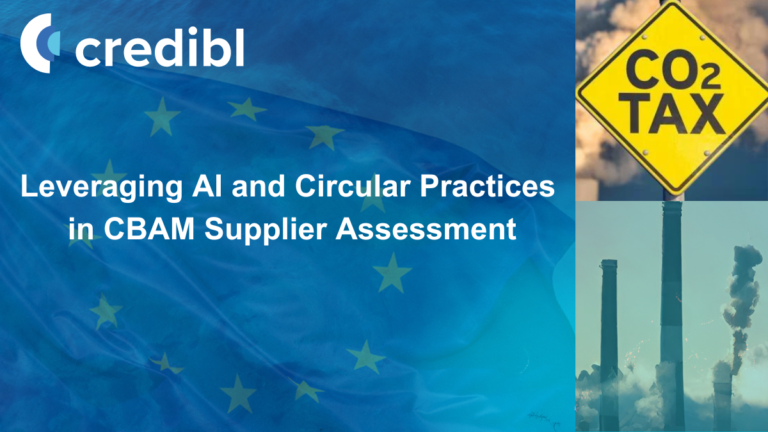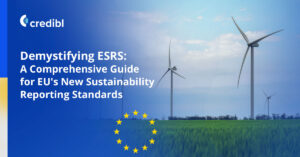Understanding the Carbon Border Adjustment Mechanism (CBAM): A Pathway to Sustainable Supply Chains
The European Union’s CBAM is a crucial policy initiative intended to eliminate carbon leakage and assist the EU’s transition to a more sustainable economy. It functions by applying a carbon tax for certain goods that are imported based on their inherent carbon emissions. The goal is to create a level playing field for EU industries while driving global climate action.
Circular Practices and CBAM:
The circular economy focuses on resource efficiency, recycling, and waste reduction. CBAM can support circular practices by rewarding imports of items manufactured using sustainable and circular processes. Suppliers that embrace circular processes may benefit from reduced CBAM costs due to lower embedded emissions.
Assessing Suppliers in the Context of CBAM
In the context of the Carbon Border Adjustment Mechanism (CBAM), assessing suppliers entails examining the greenhouse gas (GHG) emissions of commodities imported into the EU. The implementation of the Carbon Border Adjustment Mechanism (CBAM) introduces a multifaceted challenge for importers, extending beyond the mere reporting of import data. Importers rely heavily on information provided by their suppliers, heightening the complexity of ensuring accurate submissions to the EU during the transition period. The accuracy and reliability of supplier data become paramount, as importers must navigate through intricate supply chains to ascertain the embedded emissions in imported products.
This reliance on supplier data adds layers of complexity to CBAM compliance, as importers grapple with verifying and reconciling disparate datasets to meet EU reporting requirements. As the transition period unfolds, the need for robust data management practices and effective communication between importers and suppliers becomes indispensable to navigate the evolving regulatory landscape of CBAM seamlessly.
Non-compliance with the Carbon Border Adjustment Mechanism (CBAM) entails significant financial repercussions, with penalties of up to EUR 50 per tonne of unreported embedded emissions anticipated. Incorrect or incomplete filing of CBAM reports exposes importers to these hefty fines, underlining the critical importance of meticulous data accuracy and compliance adherence.
The severity of penalties underscores the urgency for importers to ensure thorough and precise reporting to avoid substantial financial liabilities and maintain regulatory compliance within the CBAM framework. The importers need to make sure following to avoid such penalties.
Evaluation of Impact:
- Determine the applicability of CBAM regulations to the commodities imported from outside the EU by your company.
- Quantify the volume of these imported goods.
- Engage with relevant stakeholders such as suppliers and manufacturers to obtain data on greenhouse gas emissions associated with each import.
Reviewing the Supply Chain:
- Collaborate with procurement, tax, operations, and logistics teams to identify actions under CBAM criteria.
- Coordinate with the indirect tax/customs team to ensure compliance with EU customs regulations.
Carbon Assessment:
- Conduct a thorough carbon assessment of the impacted products.
- Establish responsible CBAM-compliant business practices.
- Develop a methodology for calculating emissions related to the manufacturing of affected items, incorporating supply chain data to fulfill reporting requirements.
Role of AI in Supplier Assessment
Leveraging AI can improve CBAM supplier assessment in multiple ways. By harnessing the capabilities of artificial intelligence (AI), assessing suppliers under the Carbon Border Adjustment Mechanism (CBAM) can be significantly enhanced. AI offers multifaceted improvements in supplier evaluation, from advanced data analytics to predictive modeling, empowering more accurate and efficient assessment processes for CBAM compliance.
- Data Analytics: Artificial intelligence systems can analyze supplier data, discerning factors such as emissions, circularity, and compliance. Leveraging sophisticated automation mechanisms enhances operational efficiencies, enabling smoother processes within supply chains.
- Predictive Models: Artificial intelligence models can anticipate the environmental impact of various industrial pathways.
- Supply Chain Transparency: AI systems are capable of monitoring emissions throughout complex supply networks.
- Risk Assessment: AI can detect high-risk vendors using emissions data and circularity criteria.
Facilitating CBAM Compliance: Leveraging Credible ESG AI Platform for Seamless Implementation
In the ever-changing regulatory landscape, Credibl ESG emerges as a critical ally for firms negotiating the intricacies of CBAM requirements. Credibl ESG revolutionizes how companies analyze their supply chains by incorporating Artificial Intelligence (AI) into supplier ESG assessments, notably in terms of CBAM compliance. Companies can use AI-powered supplier assessments to streamline their efforts to meet CBAM regulations. Credibl ESG’s platform provides powerful data analysis capabilities, allowing businesses to process large amounts of supplier data rapidly. This gives a better understanding of suppliers’ ESG performance and assists in precisely spotting potential hazards.
Furthermore, AI-powered real-time monitoring ensures continuous oversight, allowing for quick responses to any compliance concerns. Furthermore, Credibl ESG’s AI-powered analytical prediction capabilities offer early detection of risks, allowing firms to address potential concerns before they increase, ensuring compliance with CBAM regulations. Extensibility being built to the platform means that firms can maintain high ESG standards throughout every step of their supply chain, regardless of size or complexity. Credibl ESG’s complete AI-based solutions enable easy automation of supply chain data, assisting the companies in achieving CBAM compliance targets with ease and effectiveness.
Conclusion
Using Artificial Intelligence (AI) in supplier assessments can dramatically improve CBAM compliance by allowing for data analytics, predictive modelling, supply chain transparency, and risk assessment. Platforms such as Credibl ESG provide bespoke AI-based solutions, allowing businesses to smoothly manage CBAM requirements while maintaining high ESG standards throughout their supply chains.
AI-powered solutions offer great prospects to ease CBAM compliance. Collaborative efforts and innovative strategies can enable stakeholders to leverage CBAM as a tool for achieving sustainable development and combating climate change on a global scale. By working together and implementing creative tactics, stakeholders can harness the potential of CBAM to drive meaningful progress towards a more sustainable future.
For guidance on incorporating the Carbon Border Adjustment Mechanism (CBAM) into your business strategy, get in touch with our ESG experts.









